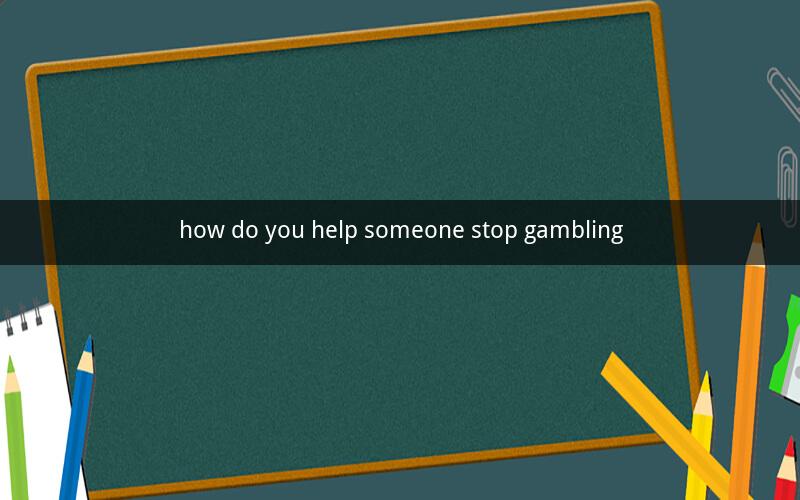
Contents
1. Understanding the Problem
2. Communicating with the Gambler
3. Encouraging Professional Help
4. Setting Boundaries and Limits
5. Supporting a Healthy Lifestyle
6. Educating About the Consequences
7. Utilizing Support Groups
8. Monitoring Progress
9. Dealing with Relapse
10. Maintaining Long-Term Support
1. Understanding the Problem
The first step in helping someone stop gambling is to understand the problem. Gambling addiction is a complex issue that often involves psychological, social, and financial factors. It's important to recognize the signs of gambling addiction, such as hiding gambling activities, neglecting responsibilities, and experiencing financial difficulties.
2. Communicating with the Gambler
Open and honest communication is crucial. Approach the topic with empathy and without judgment. Listen to the gambler's concerns and feelings without interrupting. Encourage them to express their struggles and fears. This can help build trust and make them more receptive to change.
3. Encouraging Professional Help
Professional help can be invaluable in addressing gambling addiction. Suggest seeking support from a therapist, counselor, or a specialized gambling addiction program. These professionals can provide tailored strategies and coping mechanisms to help the individual overcome their addiction.
4. Setting Boundaries and Limits
Help the gambler establish clear boundaries and limits to prevent relapse. This may involve restricting access to gambling websites, limiting the amount of money they can spend, or avoiding places that trigger their gambling urge.
5. Supporting a Healthy Lifestyle
A healthy lifestyle can aid in the recovery process. Encourage the individual to engage in regular physical activity, maintain a balanced diet, and get enough sleep. These changes can improve their overall well-being and reduce the temptation to gamble.
6. Educating About the Consequences
Educate the gambler about the potential consequences of their addiction, including financial ruin, relationship problems, and legal issues. Understanding the gravity of the situation can motivate them to seek help and change their behavior.
7. Utilizing Support Groups
Support groups can provide a sense of community and understanding for individuals struggling with gambling addiction. Encourage the gambler to attend local or online support groups where they can share experiences and learn from others who have faced similar challenges.
8. Monitoring Progress
Regularly check in with the individual to monitor their progress. Ask about their feelings, challenges, and successes. Celebrate milestones and offer encouragement during difficult times. Monitoring progress can help identify areas that need further attention and support.
9. Dealing with Relapse
Relapse is a common part of the recovery process. If the individual relapses, offer understanding and support rather than criticism. Help them analyze what led to the relapse and develop strategies to prevent future occurrences.
10. Maintaining Long-Term Support
Long-term support is essential for maintaining sobriety. Continue to be a source of encouragement and guidance. Encourage the individual to maintain their support network, attend support group meetings, and seek professional help as needed.
Additional Resources
- National Council on Problem Gambling: https://www.ncpgambling.org/
- Gamblers Anonymous: https://www.gamblersanonymous.org/
- SMART Recovery: https://www.smartrecovery.org/
Questions and Answers
1. Q: How can I help someone who is ashamed of their gambling addiction?
A: Encourage them to seek help from a professional or support group where they can share their experiences without judgment.
2. Q: What if the gambler refuses to acknowledge they have a problem?
A: Continue to show support and concern, but be prepared for resistance. It may be helpful to offer resources and information about the consequences of gambling addiction.
3. Q: Can family therapy be beneficial in treating gambling addiction?
A: Yes, family therapy can help address the impact of gambling addiction on relationships and provide a supportive environment for the individual seeking help.
4. Q: How can I help someone who is in debt due to gambling?
A: Encourage them to seek financial counseling and explore options for debt consolidation or bankruptcy, if necessary.
5. Q: What should I do if the gambler continues to lie about their gambling activities?
A: Maintain open communication and encourage honesty. Offer to help them develop strategies to manage their gambling urge.
6. Q: How can I support someone who has lost their job due to gambling?
A: Help them explore job opportunities, update their resume, and provide emotional support during the job search process.
7. Q: What if the gambler's addiction is affecting their children?
A: Encourage the individual to seek help for their addiction, as well as family therapy to address the impact on the children.
8. Q: How can I help someone who is struggling with depression and gambling addiction?
A: Encourage them to seek help from a mental health professional who can provide treatment for both conditions.
9. Q: What should I do if the gambler is considering suicide?
A: Take their threat seriously and encourage them to seek immediate help from a mental health professional or crisis hotline.
10. Q: How can I maintain my own emotional well-being while supporting someone with a gambling addiction?
A: Seek support for yourself through friends, family, or support groups. Remember to take care of your own mental and physical health.